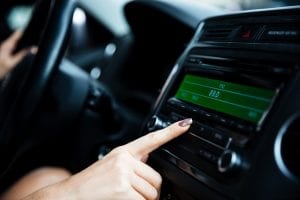Phones and smart devices make it easier than ever before to listen to music and news while you’re doing other things – and often with a simple voice command. One of the most common places to blast the tunes or catch a newscast is in the car.
But does what you are listening to affect your driving? Researchers are finding the answer is yes. In fact, a new field of research investigates how what we are listening to affects how well we can pay attention to and, ultimately, perform a task.
A review published in the journal Occupational Ergonomics looked at the body of literature on how noise impacts performance on a task, and specifically how listening to music impacts driving. Not surprisingly, the authors found a mixed bag of data. The review found evidence that music helps to improve performance in specific tasks that require a high level of concentration. That’s because music can stimulate our brains, improving our motivation and perception of energy. You may know this feeling if you’ve ever heard an energetic song that you like while working out.
But the review also found that music can be distracting. For example, you are less likely to understand what you are reading while there is music playing compared to silence. In addition, faster paced music encourages people to move at a faster pace. In one study, participants listening to fast-paced music drank their cans of soda significantly more quickly compared to those listening to slower music.
But what are the effects when you’re driving? The answer: It depends. Research demonstrates that music played at quiet or moderate volume levels improves performance and alertness while driving. There is also solid evidence that music can help to reduce stress and aggression, which can help to improve driving performance. But music played at louder volumes is more of a distraction, and was found to detract from concentration.
In addition, the tempo of the music matters. Drivers listening to faster-paced music are more likely to drive faster, but also more likely to make mistakes behind the wheel. The research also shows that music can be distracting during frustrating driving situations. Have you ever turned to radio off when the roadway becomes more crowded? More challenging driving conditions require more focus and brain power. Because music competes with this processing space in our brain, it can overwhelm the brain.
The take-home message? Listening to music can actually help to improve your driving, but it depends on the situation. If you have a tendency toward speeding tickets, avoid fast-paced music that is likely to lead you to drive faster. And if you’re in a new place or experiencing heavy traffic, you may need silence to help you better concentrate.




Speak Your Mind